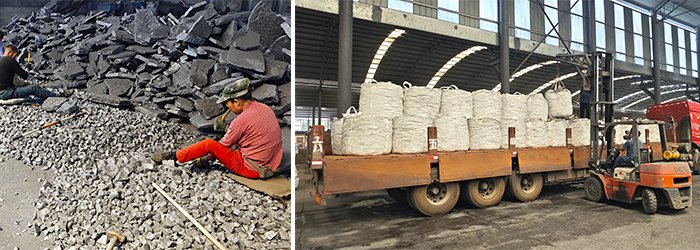Ferrosilicon is a crucial material widely used in steelmaking, casting, and various industrial applications. Composed primarily of silicon and iron, it often contains trace amounts of aluminum, calcium, manganese, and other elements. To ensure the quality and performance of ferrosilicon meet industry standards, testing methods are essential.

Why is Ferrosilicon Testing Important?
The quality of ferrosilicon directly impacts the performance and cost of steel products. Substandard ferrosilicon can lead to insufficient steel strength, casting defects, or reduced production efficiency. Therefore, testing the composition, impurity content, and physical properties of ferrosilicon is critical to ensuring product quality.
Key Testing Methods for Ferrosilicon
1. Chemical Composition Analysis: Chemical composition is the core indicator of ferrosilicon quality. Common testing methods include:
- X-Ray Fluorescence (XRF): A non-destructive method that quickly analyzes the elemental composition of the alloy.
- Inductively Coupled Plasma Optical Emission Spectroscopy (ICP-OES): Provides highly accurate measurements of trace elements and impurities.
- Spark Optical Emission Spectroscopy (OES): Ideal for on-site testing, offering rapid and reliable results.
2. Physical Property Testing: Physical properties such as density, hardness, and particle size are critical for specific applications.
- Density Measurement: Determined using the Archimedes principle or pycnometer methods.
- Hardness Testing: Measures resistance to deformation using methods like Brinell or Rockwell hardness tests.
- Particle Size Analysis: Conducted using sieving or laser diffraction techniques to ensure uniformity.
3. Impurity Content Testing: Impurities like phosphorus, sulfur, and aluminum can negatively affect alloy performance. Testing methods include:
- Combustion Analysis: Measures sulfur and carbon content.
- Wet Chemical Analysis: Traditional methods for detecting phosphorus and other trace elements.
4. Microstructure Analysis: Microstructure analysis helps evaluate the alloy's internal structure and uniformity. Techniques include:
- Optical Microscopy: Examines grain size and distribution.
- Scanning Electron Microscopy (SEM): Provides detailed images of the alloy's surface and internal structure.
5. Mechanical Property Testing: For applications requiring high strength and durability, mechanical properties are tested using:
- Tensile Testing: Measures the alloy's strength and elongation.
- Impact Testing: Evaluates toughness under sudden stress.

Best Practices for Ferrosilicon Testing
- Follow International Standards: Adhere to standards such as ISO, ASTM, or EN to ensure consistency and reliability.
- Use Certified Laboratories: Partner with accredited labs to guarantee accurate and unbiased results.
- Regular Sampling and Testing: Implement a routine testing schedule to monitor quality over time.
- Leverage Advanced Technology: Utilize modern analytical instruments for faster and more precise results.
- Document and Analyze Data: Maintain detailed records to identify trends and improve quality control processes.
Choosing the Right Supplier
When selecting a ferrosilicon alloy supplier, consider the following:
- Quality Certifications: Ensure the supplier complies with international standards.
- Testing Capabilities: Verify if the supplier conducts comprehensive in-house testing.
- Transparency: Request detailed test reports and certifications for each batch.
- Reputation: Research the supplier's industry reputation and customer reviews.
Ferrosilicon testing is a vital step in ensuring product quality and performance. By understanding the key testing methods and best practices, you can make informed decisions and choose reliable suppliers. Whether you are a procurement professional or an industry expert, this guide provides the knowledge you need to optimize your ferrosilicon selection process.
For more insights into ferrosilicon alloy and other industrial materials, feel free to contact.
Contact Us Today!
We welcome inquiries in English, Español (Spanish), Русский язык (Russian), Français (French), and العربية (Arabic).
Our professional team will reply to you within one business day. Please feel FREE to contact us!
Your privacy is important to us,we are committed to marking sure your privacy is
confidential.
